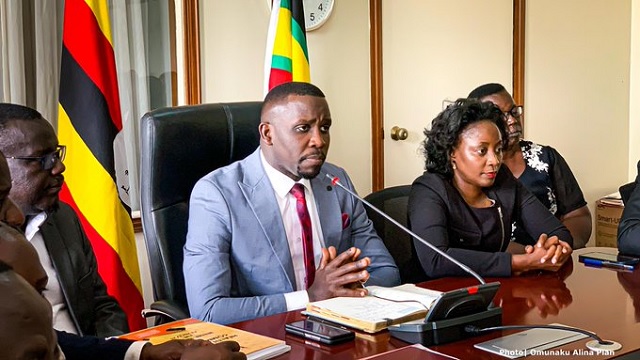
Kampala, Uganda | THE INDEPENDENT | The Shadow Cabinet has demanded an investigation by the Inspector General of Government (IGG) into the alleged sh100 million payout to Members of Parliament from classified expenditure, describing the transaction as “organized corruption” orchestrated by President Yoweri Kaguta Museveni.
Speaking at a press conference held on Tuesday, April 15, 2025, at Parliament, the Leader of the Opposition, Joel Ssenyonyi, and the Shadow Minister for Justice and Constitutional Affairs, Jonathan Odur called for urgent accountability on the matter.
The Shadow Cabinet also accused the Speaker and Deputy Speaker of frustrating legislative oversight by blocking debate on audit reports related to classified expenditures.
“We are calling on the IGG to take up this matter and investigate what appears to be institutionalized corruption. Parliament must not be used as a laundering ground for misuse of public funds under the veil of classified budgets,” said Ssenyonyi.
The opposition leaders further demanded amendments to the Public Finance Management Act (PFMA), 2015, to strengthen transparency and prevent future abuse of public resources.
Odur emphasized that allowing Parliament to scrutinize and debate classified expenditures is essential for upholding accountability and protecting taxpayer funds. The opposition leaders condemned the alleged payout, labeling it as “dubious” and a threat to transparency and accountability in public finance management.
Reports that emerged last week suggested that MPs received the money either from Parliament or directly from the Speaker’s official residence in Nakasero. A video clip shared by Ssenyonyi appeared to show legislators entering Parliament at night with bags, allegedly to collect the cash.
However, Deputy Speaker Thomas Tayebwa on April 15 denied the allegations during plenary, following a query raised by Muhammad Kivumbi (Butambala County). This came despite a letter from President Museveni dated April 11 confirming the payments to MPs.
During the same press briefing, the Shadow Cabinet unveiled a list signed by 72 opposition MPs disassociating themselves from the cash handouts. They alleged that the money was used to entice MPs into supporting the controversial Coffee Bill and an upcoming amendment to the Uganda People’s Defence Forces (UPDF) Act, which is expected to be tabled this week.
The opposition’s concerns come in the wake of the Supreme Court’s January 31 ruling, which nullified the prosecution of civilians in military courts. In response, the government is reportedly seeking to amend the UPDF Act to allow court-martial jurisdiction over civilians.
Jonathan Odur accused the presiding officers of abdicating their oversight role by failing to allow adequate scrutiny of classified budgets, which he said opens the door to abuse.
Odur, who also represents Erute South, emphasized that proposed amendments to the PFMA, 2015, have long been stalled. He blamed this on persistent obstruction by parliamentary leadership, which he said has denied MPs access to vital audit reports needed to trigger informed debate and reforms.
Parliament on March 12 approved the Third Supplementary Schedule, worth Sh4.255 trillion, bringing the total supplementary allocations for the 2024/25 financial year to Sh6.548 trillion. The increasing number and size of supplementary budgets have raised concerns over the government’s fiscal discipline.
Among the notable allocations:
- Sh98 billion was approved for Italian investor Enrica Pinetti for the controversial Lubowa Specialized Hospital project, bringing the total public investment in the project to sh 774.469 billion.
- Sh115 billion was allocated to Somali investor Amina Hersi for Atiak Sugar Factory, raising government investment to Sh668.710 billion.
- Sh367 billion was channeled to State House under classified expenditure, pushing its 2024/25 budget to Sh1.053 trillion.
Shadow Minister for Finance Ibrahim Ssemujju Nganda decried the growing classified budget under State House, warning that with its current allocation, the presidency is now spending approximately Sh2.8 billion per day, Sh120 million per hour, and sh2 million per second.
“Classified expenditure has become a loophole for siphoning public funds,” Ssemujju said. “Initially, the State House had sh8 billion for classified activities. With two supplementary requests, this now totals Sh600 billion—representing 57% of its entire budget.”
The Leader of Opposition further revealed that over the last five financial years, the government has spent at least sh16.8 trillion on classified expenditures, averaging sh3.5 trillion annually.
In Uganda, according to the Public Finance Management Act 2015, classified expenditure refers to the expenses and commitments incurred by an authorized agency for the collection and dissemination of information related to national security interests.
This includes the cost of procuring and maintaining the related assets. Essentially, it covers sensitive and confidential government spending that is not publicly disclosed, such as military or covert operations.
***
URN
 The Independent Uganda: You get the Truth we Pay the Price
The Independent Uganda: You get the Truth we Pay the Price



